Caroline Leavitt's Blog, page 111
June 5, 2012
Elizabeth Collins talks about the loaded subject of The Beautiful Anthology
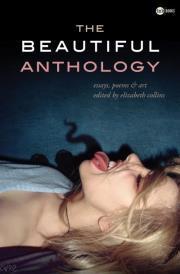
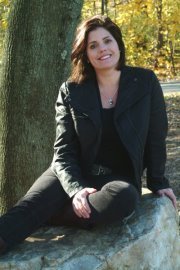
I first heard about the Beautiful Anthology from the superb writer Gina Frangello. Because I love Gina's writing and I trust her judgement completely, I wanted to see a copy--plus, beauty is such a queasy kind of topic. What's beautiful? Who decides that? And what does it do to us if we don't fit the general norm? (Please don't make me go back to my teenaged years, where I was routinely mocked, caricatured and threatened for the way I looked.) The Beautiful Anthology is provocative, inspiring, and yup, important. I asked writer/editor Elizabeth Collins, who put together the anthology of essays, poems and art, if she'd come on my blog, and I'm honored she said yes. Thank you so much, Elizabeth.
What sparked the idea for this collection? Were there any surprises?
We have so many great contributors at TNB. (The Nervous Breakdown.) Getting a group together for an anthology seemed like a natural project for TNB Books.
Beauty was chosen as a topic because it's a universal theme. Everyone has an opinion about it; everyone has a story and strong feelings about the subject.
As for surprises--yes, definitely. I was pleasantly surprised by some of the creative twists in many of the essays. For example, I asked my writer friend J.E. Fishman to contribute, and he came up with a fascinating piece about the most beautiful tennis serve he ever hit. Similarly, one of the first students I taught--now a grown-up and a very talented writer--Nora Burkey surprised me with her mature, feminist take on why we should not impose Western ideals of beauty on other parts of the world. I could go on, of course. The point is that many of the essays and stories have an interesting, unexpected angle. I would say that The Beautiful Anthology explores the flip side of beauty, and not necessarily the literal definition of the word.
This seems like a collection that would really touch a nerve. Can you talk a bit about that?
I think beauty is a loaded subject. Most of us feel that we don't measure up in terms of beauty. We might feel resentful about the ideals of beauty that are always shoved in our faces and that are always changing. Fashions change; the general notion of what is beautiful (in terms of fashion) changes. But beauty should be more than that. Beauty should be a feeling, a state of grace, a happy place where we simply feel our best and at peace with the world.
Sometimes, when we think about beauty, we immediately also think of when we did not feel beautiful, when the beauty was outside of us and not in us, but we longed for it.
What I find interesting in the anthology is the different takes on beauty that our male and female contributors have. The female experience is often fraught with fears of not measuring up, and full of worry about what we'll look like when we grow up. The male experience is conscious of not wanting to judge the opposite sex too harshly, and/or finding a new vantage point from which to discuss the subject of beauty.
I was really moved by your piece, by the way something that happened in the past still has such an impact, almost like a scar. (I still can remember my mother saying I looked like a wild woman with my hair--and I was only five!) Do you think we ever get over those scars?
As for my piece, well, it's funny that I don't remember what I had for breakfast yesterday, but I remember precise details about what life was like when I was five (and even a bit younger). I think the healing comes from a place of acceptance, a realization that "this is who I am. This is what I look like." My story is about a scar--but we all have scars of some kind. We can let those scars bother us, or can we not even see them anymore (as is the case with me). It's also about taking care of what you have and making the best of it. We can absorb the things we are told about what is beautiful or how to be beautiful, but ultimately, we have to make our own way and be who we are.
I loved the photos in the book. Who did them?
The photographs in the anthology are all finds of our intrepid and talented book designer, Charlotte Howard. (I can direct you to her for more on the photos; she got them all and made the placement decisions)
Do you think women will ever not be burdened by the idea of what they should look like?
As for whether or not I think that women will ever NOT be burdened by ideas of what they should look like? Well, we are assaulted constantly with media ideals (magazines, TV, film) and images of models and infomercials about fitness, etc. It's literally impossible to be unaware of what the marketers are trying to sell us (or make us feel insecure about). Even if we moved off the grid and isolated ourselves, we would still have some hopes for our looks and our body, perhaps based on family members' influence, or our neighbors or friends. I think that it is when we get away from our natural states that we start to be less beautiful--and by this I mean that if our bodies are very out of whack in terms of size, then that's a signal to us that our weight is unhealthy. After all, the "perfect" size woman is supposed to be some ideal of fertility, her shape literally a signal that she is good mother material. On some level, the human animal will always find the "healthy" specimen the most attractive, and when we feel good, we tend to look good, so it's all a circle.(I am probably getting too literal and biological--sorry.)
What's obsessing you now?
Do you mean in terms of projects and writing, or beauty-related topics? I am in the final stages of memoir writing/pre-pub madness. My memoir, Too Cool for School, is about my experience as a English teacher in a girls' school. I got pretty caught up in my persona as "rock star teacher" (which is embarrassing to think about now) and I was constantly being tapped for new classes, new projects. On one level, perhaps it was because I was versatile and I'm a writer, so it makes sense to ask me to teach lots of different kinds of writing, but on the other, I had people say to me, "They are setting you up to fail. No one can teach that many classes well." And it's true. At some point, the house of cards has to fall. In my case, I was blindsided by a politically motivated attack by a couple of parents who wanted me fired because I am a Democrat, and it became this horrific witch hunt that nearly killed me. Sounds dramatic, but when your purpose in life is attacked, it can leave you reeling. So that story is what is coming next, but even that is a subject I am over because I have been living it (and the attendant notoriety) for years. I am telling the story and I wrote the book in the hopes of helping protect other teachers, particularly in the hyper-partisan landscape and partisan teacher hate that's been going on. I really want to work on my new YA novel, though. If I could get my draft done this summer, I will be happy.
What question didn't I ask that I should have?
As for unasked questions, I suppose I'd like to address the idea that The Beautiful Anthology is not chick lit; it's a universally appealing (I hope) exploration of many facets of beauty. We have male contributors; we have sad stories, funny stories, academic stories, political stories--a great mix of fresh voices from an international slate of established and emerging writers. Now, I realize that sounds too promo, but I feel I have to say it if I can.
Published on June 05, 2012 12:59
Rebecca Woods, author of Living Through Charlie, talks about the Mommy Competition
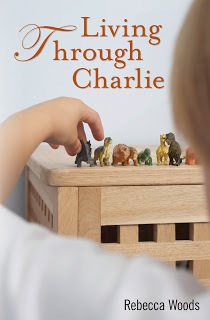
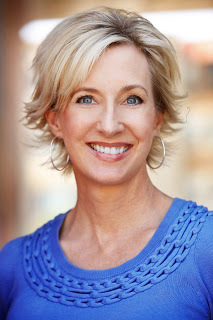
Rebecca Woods was a student of mine in my UCLA class, and I got the pleasure of seeing her novel, Living Through Charlie, grow. She grew up in Orange County, California, and she's got a bachelor's degree in Drama and attended the Community of Writers at Squaw Valley. A former drama teacher in “a posh private school” as well as a special education school, she lives in Southern California with her husband, her two mean little dogs, a parakeet, and three tortoises, and is working on her second novel. Rebecca wanted to write something different for my blog, and I gave her carte blanche. So thanks, Rebecca!
The Mommy Competition
If you’ve spent a good portion of your adult life either driving a car or looking for your keys so you can drive your car, chances are you’re a mom. And if you’re a mom, chances are you occasionally have doubts that you’re doing it right. Okay, you frequently have doubts. You wallow in doubt. You lap it up from a spoon and wear it daily as a skin suit Silence of the Lambs style. This insecurity fuels something I call Mommy Competition. You know what it is, it’s that need to figure out who’s doing it better. That uncontrollable desire to look at another mom’s kids, do a quick assessment and decide who is the Alpha Mom and who is most likely to serve dinner by tossing a greasy bag of food from a drive-through window into the back seat of the mini-van on the way home.The best way to quickly establish the identity of the Alpha Mom is to greet each other with A Question About Each Other’s Children. “Is he breastfed?” “Is she talking?” “Walking?” “Reading?” “Applying to preschool?” That’s right. I just said, “applying to preschool” like that’s a normal thing that normal three year olds do everywhere. They don’t. But in communities where there’s a waiting list for toddler tutors, Mommy Competition rises to a near professional level.If you live in the school-by-application-only culture like I do, you’re lucky! Your town has conveniently set up a Mommy hierarchy for you! Recognizing the Alpha Mom is as easy as knowing the reputations of the local private schools. There are the good schools and there are the schools-your-kid-got-into-because-he-couldn’t-get-into-a-better-school-so-you-must-be-a-crappy-mom. It starts with preschool- “So, where is Hydrangea going to preschool?” What you’re really trying to find out is- Were you teaching your kid the alphabet while I was drinking wine and playing Yo Gabba Gabba on a continuous loop? Did you have a reward system for your child that never included you saying, “Fine. Here’s the damn cookie.”? …like me.Most of the private elementary schools in my area have uniforms. This is a wonderful shortcut if you have to establish who the Alpha Mom is from a distance. (If your child’s school doesn’t believe in uniforms, there’s a whole different ranking system involving license plate holders and the Whole Foods and Trader Joe’s parking lots but it’s too complicated a formula to explore in such a brief blog post.) Should two moms encounter each other in the wild and the children are wearing uniforms, you can skip, “Where is Petunia in school?” and go straight to, “What is Carnation up to?” Carnation went to summer camp in Costa Rica where she hand pollinated indigenous vines and then she won the third grade science fair with the paper she wrote about it! Damn it. But Carnation isn’t in school right now. Yes! She’s got a tutor on set until her movie wraps. You win. I give.My kids are in their mid-twenties so I should know better. And, in spite of (or maybe because of) my inability to ever rise to the role of the Alpha Mom based on this Mommy Competition criteria, my kids are seriously awesome! Seriously. Nevertheless, I actually did the let’s-see-how-I-rank-as-a-mom thing at a Pilates class yesterday. (Yes, I do know how that sounds. I already told you I live in a private school environment, that there are Pilates classes nearby shouldn’t be that much of a surprise.) I ran into a mom I hadn’t seen in about fifteen years and I greeted her with, “Oh my gosh, hi! So, what is Chrysanthemum up to?” We were doing the back and forth about her kids and my kids (I was winning, by the way, it seems little Chrysanthemum is still living at home and hasn’t chosen a college major) and I suddenly realized what I was doing! I don’t want to do this, I’ve already won this game! She’s won this game! Being a mom is hard, we shouldn’t be competing with each other, we should be supporting each other! So what if Chrysanthemum hasn’t chosen a college major, one of my kids flunked out of the first college she went to! And even though Carnation won the science fair in third grade, she could get bullied every day in fourth grade like my other kid did. Suddenly I blurted out, “I wrote a book! It’s about private school moms trying to live vicariously through their kids and what it’s like for one mom when her kid doesn’t fit in!” Our conversation stopped as my faux pas hung in the air. Did I really just start talking about myself instead of continuing to rank our kids’ accomplishments so we can identify the Alpha Mom? We stared awkwardly at each other’s Lululemon workout gear for a moment not knowing what to say as if I had made a racial slur or an inappropriate political comment. Finally I broke the silence. “And I’d love to hear what you’ve been up to.”
Published on June 05, 2012 12:06
May 29, 2012
Dead Beats, the astonishing student run publication/readings/organization speaks!
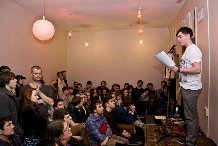
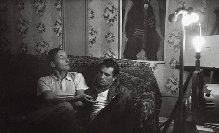
I first heard about Dead Beats on twitter. An uber-successful student run group, Dead Beats doesn't just share the works of published writers, but it acts as a lift-off for unpublished ones. The top photo is from one of their sell-out crowded readings, and of course, you know who is in the second photo! (HINT: Kerouac and William S. Burroughs). I'm honored to host them here--and hope you all will support their readings (in the UK right now), and submit to them! Thank you, Dead Beats!
How did the idea for a student run publication organization come about? What was the initial reaction?
Dead Beats originated in a post-seminar study group whose numbers quickly dwindled to form the core membership of three that composes the organisation today.
Already deft at using social media to communicate with each other, the thought of broadening the readership was simply an organic step. We wanted to share not just extracts from published canonical authors, but also other unpublished writers' homespun material that would otherwise remain unseen.
The initial reaction was stupendous and the reach astounding: within our first two months we received upwards of one hundred submissions from the world-over and the fact that we published 62 pieces in only our second month of being established is a great affirmation of the vital role literature still plays in modern society. We were surprised and overwhelmed at the amount of support we received.
What made you decide on your wonderful name, Dead Beats, and how do you reach out to writers all over the world?
As relationships and group dynamics settled, we came to the realisation that the Beats were formative to our thinking; the sentiments of that generation, and the methods with which they expressed them, struck a chord.
However, the name was more of a formality than anything else. It described both our dispositions at this time last year and referenced our departed heroes.
As for reaching people, we still rely on word of mouth primarily and this seems to engender a more grassroots feel to the blog.
Who decides what gets published? What's the process like?
The three of us converge on a weekly basis to discuss each individual submission we receive, usually over coffee or pints depending on extraneous circumstances. Decisions are predicated on mutual agreement within the group. There are quite a few disagreements over submissions at times, and when this variance occurs is when we most look forward to the reader response.
There is a misconception amongst some of our contributors that we are only interested in work of a Beat orientation, yet, Dead Beats publishes work of both an inspired and inspiring nature; the Beats stirred the ethic of the blog but their work doesn't define our goals.
We have no reading season and accept submissions of short stories and poems all year round. We believe that this marks us out from other literary journals, as we are all about keeping a constant flow of literary quality.
What do you see that is up next for Dead Beats?
We intend to collate an e-book compendium of our favourite writers thus far, curate even bigger poetry events and try our hand at organising regional workshops. Sheffield is just one city with followers; we have the world to explore yet.
You've been getting sell-out crowds for your performances. Any chance of you bringing Deadbeats to the USA?
Only if you're paying!
Though tongue out of cheek, we will venture as far afield as we can when the funds allow it. Expanding literary awareness across the globe is a notion that very much motivates us. Should a city call, we'll be there.
What's obsessing you now?
Currently, we are on the cusp of celebrating our first anniversary gig. We're determined that it'll be the best poetry night Sheffield's seen: we've bought party hats and benzedrine, so it better be good!
What question didn't I ask that I should have?
You might have asked: "Who are the Dead Beats?"
We would have responded: "There is no 'Dead Beats', just a bunch of guys trying to get published" (Ginsberg circa Sheffield 2012).
Published on May 29, 2012 12:58
May 19, 2012
Emily St. John Mandel talks about The Lola Quartet, Inspiration, jazz, and so much more
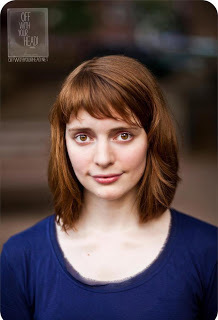
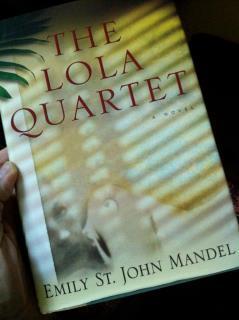
I carried around Emily St. John Mandel's The Lola Quartet because I couldn't bear to stop reading it. A #1 Indie Pick for May, it's so ingeniously plotted, so rich with character, that I found myself underlining the pages. Of course I tracked Emily down and begged her to let me interview her, and she was gracious enough to agree. I don't know what to thank you for more, Emily, your mind-blowingly good novel or this fantastic interview, so I'll say thank you for both.
I couldn't begin to classify this brilliant novel--it's part literary noir, part crime thriller, and you could even say it's adult coming of age. Was the mixing of genres a deliberate choice? This, of course, leads us to my question of choice: How do you write? Do you plan everything out? Do you start with character?
Thank you! I truly appreciate the kind words. With regard to genre, what I want is to write literary fiction with the strongest possible narrative drive. I never set out to write crime fiction. I was surprised to discover that whether you think of your own work as being literary fiction or not, if you start adding a lot of plot then people start calling them crime thrillers. I try to just write the best book I can without worrying too much about where it's going to be shelved in the bookstore.
I don't plan anything out. My first two books began with wisps of premises, but this one was a little different, more a matter of a number of topics and ideas that I wanted to write about coming together. The first was a plumbing problem. When I was eighteen and nineteen I had my own (very small) apartment in Toronto. Living alone felt like freedom and I loved it, even though covering the rent took more than half my income at the time. (The rent wasn't that high, but I worked in a coffee shop.)
At a certain point the shower started leaking extremely hot water. Plumbers would come by and fix it and then it would instantly break again, and the condensation was such that before long I had a situation where it was more or less raining in my bathroom and there was water running down the walls. I imagined the damage being done to the paint job was irreparable, but at the time this struck me as a reasonable trade-off for the landlord's failure to do anything about the cockroaches. (Like I said, I was nineteen.)
I liked the idea of rain falling indoors, and it was always something I wanted to write about. I also knew that I wanted to write about foreclosed real estate and Florida's exotic wildlife problem, after reading a couple of articles on those topics, and I knew I wanted to write a novel about the economic collapse. The collapse was such a strange time and there's still such uncertainty. I was also fascinated by the Jayson Blair story a few years back, and I wanted to write about a disgraced journalist.
I loved the jazz motif that plays throughout the novel. How do you come by your knowledge of jazz?
Thanks. I studied piano for years as a child and teenager, but I never played jazz and I still don't feel like I know that much about it, to tell you the truth. There's a gypsy jazz guitarist who plays a regular set at a club about a block from my apartment, so I've spent a lot of time listening to him. I've also read some Whitney Balliett; he was a writer who chronicled the New York jazz scene of a few decades ago, and I liked reading about those musicians. Once I knew that gypsy jazz guitar music would be a part of the book, I spent some time reading about the life of Django Reinhardt.
Loyalties shift, things are not what they seem, and it all builds to an ending that left me thunderstruck--the kind of "never ending story" ending that I love, that made me continue to wonder about these characters' lives. Did this ending surprise you as you were writing it?
The whole story surprised me. I never know where any book I start writing is going to go. I just start writing and hope for the best. I'm glad you liked the ending… it was the hardest thing in this book to get right. I must have rewritten it a dozen times. It hasn't been a universally popular ending, but it's the only ending that made sense to me.
What's obsessing you now--and why?
I've been interested in orchestras lately. Partly because there's an orchestra in the novel I'm presently writing, and partly because I love music and I find that orchestras are beautiful things to watch in action; there's something moving to me about that many people collaborating to create a live experience.
Published on May 19, 2012 14:01
Laura Harrington talks about Alice Bliss and the credits that follow our names
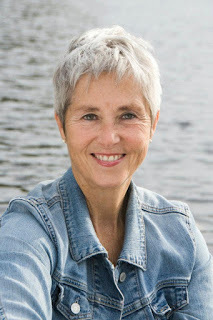
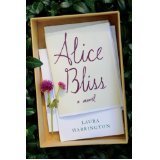
Laura Harrington's Alice Bliss is a remarkable, haunting novel about a girl grappling with her father's being deployed to Iraq, coming of age, and the aching bonds of love. Harrington's an award-wining playwright, lyricist and librettist, and I am honored to have her writing something for my blog. Thank you, Laura!
A Modest Life
Laura Harrington
My father was an exceptionally modest man. Born in 1917, the third youngest of thirteen children, he was a wonderful listener and rarely talked about himself. His highest form of praise was to call someone a true gentleman; he revered the old-fashioned attributes of grace, modesty, and service to others. After he died I found a list he had written on a piece of three-ring notebook paper, titled “credits.” I love this list so much I’ve framed it and it hangs in my office as a source of inspiration.
In our brave new world of self-promotion and online sharing of our lives, so many people now seem to come pre-packaged with a list (often of “credits”) following their name. Not too many years ago, we had hyphenates; the classic example was: writer-director, which looks so moderate now, almost self-effacing. Then the hyphenated lists started to grow until they became ungainly, such as chef-entrepreneur-television personality-artisanal cheese maker, etc
Now, thanks to Facebook and Twitter we can all have lists after our names. We package our public personas in quick, sometimes witty profiles. These are like mini online dating entries, meant to communicate enough to inspire “following” or “liking.”
I wish my father were still here so that I could ask him what motivated him to write that list. Was it all those years of coming to my plays and reading theatre programs where my "credits" were listed? Who knows? But my father’s list doesn't include any of the credits we now expect to follow someone's name, and that should, by all rights, follow his name, such as World War II veteran, accountant - turned entrepreneur, wine merchant, wine importer. None of that.
Top of the list: selling magazines door to door during the depression, which is how he helped feed his family when he was twelve and thirteen years old. He sold the Saturday Evening Post, Ladies Home Journal and the Country Gentleman, until he started caddying at age fourteen, and became Caddie(sic) Master at Ridgemont Golf Club.
Other items on the list:Played on Marshall High School’s basketball, soccer and golf teams.Lt. U.S. Army-AirForce. (Nothing about being a navigator/ bombardier, how many missions he flew from France into Germany, what medals he was awarded.)Coached basketball.Started Biddie Basketball League.Started Little League team in the 18th Ward.Coached Little League.Secured 6000 signatures for Ike for President.Appointed 18th Ward Republican Committeeman.Helped AFS (American Field Service) recruit families for foreign student exchange.Co-President of AFS, Penfield chapter.Co-President of Baird Road School PTA.Helped organize/ fundraise for the new Episcopal Church in Penfield.Sunday school teacher. Classes held in our home until the church was built.Member of Brighton Rotary Club.President of Brighton Chamber of Commerce for two terms.
What I love about this list is that it gives such a clear picture of the man. He served in the Air Force, raised four children, participated in politics, volunteered his time to enhance children’s lives through education, sports and foreign exchange, built a church, and was active in his business community. He thought children should learn to compete by playing games so that we might avoid competition on the battlefield, and he championed foreign exchange as a means of diminishing differences in the hope that we might learn to live peacefully side-by-side.
I wonder, in spite of my theatre credits and even adding in my teaching credits, whether my life and my contributions can possibly measure up to the idealism and dedication of my father’s exceptionally modest life.
Published on May 19, 2012 13:55
Eileen Riley-Hall talks about writing and her new book, Parenting Girls on the Autism Spectrum: Overcoming the Challenges and Celebrating the Gifts
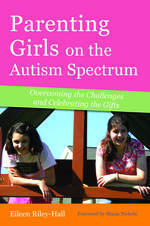
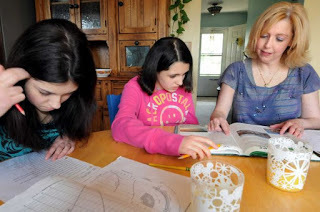
There are a lot of everyday heroes and heroines in life, and I truly think Eileen Riley-Hall is one of them. She's raising two daughters with autism, and when she couldn't find a book that offered any sort of hope, she decided to write one herself. Parenting Girls on the Autism Spectrum: Overcoming the Challenges and Celebrating the Gifts dispels myths and emphasizes practical advice on raising a child with special needs. I asked Eileen if she would write something for my blog, and I'm honored to have her here. Thank you so, so much, Eileen.
I always loved to write, and always hope one day to write a book. Freshman year of high school days I was enamoured of F. Scott Fitzgerald and his crazy, tragic wife and muse Zelda. In my junior year I read Look Homeword Angel, “a stone, a leaf, an unturned door.” It became my obsession. I carried the book around with me like a monk carries his prayer missile. I even chose Thomas as my confirmation to the consternation of my parents and the Bishop. I know; I was a geek. In my defense, I was a well-rounded geek, however. I was also a mathlete in high school – you know, feverishly solved math problems in competition with nerds from other schools. But books were still my first love. I majored in English, after a brief stint as a philosophy major. My father begged me to choose a major that might actually lead to employment some day. Apparently positions as philosopher kings are increasingly rare and don’t pay off college loans. But as an English major, still I read and admired the stories of these tortured artists – it all seemed so romantic to me. To live a life so dramatic and full of such heavy sighs and waning sunsets. Then, life happened, as it does for all of us. I graduated from the grassy knolls and intellectual discourse of college to join the “real world.” Eventually after a bumpy start at several boring desk jobs, I found my career as a teacher. It only took one year of teaching middle school to realize that teaching is not about books; it’s about children. That year my feet touched the ground, and I liked it. I found the characters in front of me every day more compelling and complex than any character in a book. Reading To Kill a Mockingbird (still my favorite book of all time) became about hearing their stories of siblings and families unusually configured. Then, life happened again. I became a mom – probably the most real experience I think a person can have. Oh, did I fall in love, like a crazy person. First with Lizzie, my brown-eyed girl, all serious and contemplative. And then two years later with her sister Caroline, my smiling party girl, all energy and hugs. Never did I think there was anything unusual about them. They were delightfully original and quirky and sweet. Then when Lizzie was five, her nursery school teacher told me to have an evaluation done with a developmental pediatrician. Lizzie was shyer than other kids, more high strung. While having Caroline in tow that day proved profound. The doctor pronounced Caroline autistic and Lizzie somewhere along the spectrum between Pervasive Developmental Disorder and Asperger’s. I was, of course, devastated. What would this mean? Why had just been eliminated from their futures and mine? I turned to my old friends: books. But unfortunately, the books I found were grim, hefty tomes describing therapies and struggles, or scary experimental interventions to be followed like some new religion. I decided to become an expert, if not on autism, on my girls. And in ten years, I read everything I could, and talked to everyone I could. And now at 13 and 15, my girls are nothing short of miraculous. Are they still “on the spectrum?” Yes. Are they in any way diminished as people? Not one bit. I learned that a diagnosis is not a prophecy and autism is just a word to describe some stuff that might be harder for them to learn. But today, Lizzie participates in her school’s musical productions, and she earned straight A’s all freshman year. And Caroline still has autism, but she plays the trumpet in her school band, and she is learning algebra. Lizzie has perfect pitch and a lovely voice, two gifts from Asperger’s. And Caroline is funny, does dead-on impressions of friends and neighbors, and is a virtual palm pilot of dates, times, birthdays, and holidays. Gifts from autism. So, I wrote a book. To share my evolved understanding of autism and the irrelevancy of the word disability. We all have our struggles, don’t we? Some have labels and some don’t, but they are within us nonetheless . The “characters” in my book don’t attend fancy parties, nor do they wax poetic about bullfighting over too many cocktails. They don’t lament the emptiness of love, nor the disappointment of success. They are my girls and the many amazing children like them who keep trying even when the whole world seems to say give up. I realized that writing a book isn’t about metaphors and angst; it’s about having something to say, something other people need to hear. My girls are really the authors of my book. I was just privileged enough to be there watching in amazement and writing it all down for everyone else.
Published on May 19, 2012 13:46
May 14, 2012
Meg Pokrass, author of Damn Sure Right, talks about being silly, screenwriting, Damn Sure Right, and more
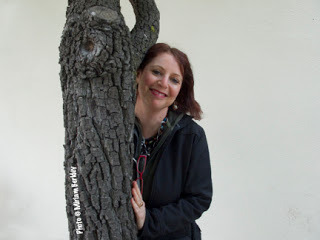
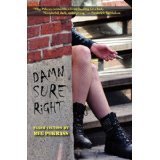
Meg Pokrass writes flash fiction, poetry and makes animation--and her new book, Damn Sure Right (great title, right?) is absolutely wonderful. Her work has appeared in over 100 online and print publications from the Rumpus to the Mississippi, and she runs the incredible Fictionaut Five author series. Nominated for Dzanc's Best of The Web, the Pushcart Prize Anthology and more, she also teaches writing privately. I was honored to interview her for the blog.
You studied acting, so I want to know, does it help with writing? (Should I do it?)
You should if it sounds like fun! It can't help but stimulate creativity.
Everything I know about writing I learned by studying acting at age 8 - 25 and by reading wonderful books and plays starting very early. I was very taken by the work of Tennessee Williams, Sherwood Anderson, Wendy Wasserstein. I've never taken a formal writing class. Everything I learned as a writer came from the early training, such as working with sense-memory recall, and how to develop an awareness of character motivation. Showing through this behavior, not telling.
One learns the power of rhythm through use of inflection, learns to listen to the subtleties in dialog... I had an interesting acting teacher who said, "Every scene... every relationship.. all moments in life involve some subtle relationship to sex, how there is sex in everything." I still can't figure this out... and I don't think I agree... HOWEVER, I do write a lot about sex.
I also write a lot about my fear of abandonment (one of my life-long issues), getting older, losing places and people. I use my neurosis, I make lemonade from my emotional lemons.
Here are 3 acting quotes which make just as much sense to me in writing:
"One of the things I like about my profession, and that I find healthy, is that one constantly has to break oneself to pieces." - Liv Ullmann
"Acting doesn't have anything to do with listening to the words. We never really listen, in general conversation, to what the other person is saying. We listen to what they mean. - Jack Lemon
"Acting is behaving truthfully in imaginary circumstances." - Sanford Meisner
Why flash fiction? Did you gravitate naturally to it or was this something you tried and found it was a perfect fit. Do you also write longer fictions, or even contemplate a novel?
Prose poetry and narrative poetry got me first. I started writing poetry in the 1980s and was encouraged by two great mentors and poets, Molly Peacock and Ellery Akers. My poetry was fairly narrative, and I had no idea that I was trying to write little stories. I found that out later. When I took a hard look at my poetry, it was flash.
I recently completed writing a novella created from flash fiction and prose poetry fragments. It is semi-autobiographical.
I have to say that when i figured out poetry was not really my form, it opened the world up. I was less inhibited and clumsy immediately. I don't know why. I felt like someone who had danced ballet realizing they were better at modern dance.. I jumped into flash with glee and haven't been able to leave it.
I still write poetry, but the weight of that form is lighter on me now.
You've been commissioned to turn the book--or some of the stories--into a script! How did that come about? What's it like for you? My friend, screenwriter Eugene Corr, who wrote one of my favorite movies, "Desert Bloom", told me my work is quite visual, which was interesting to me -- and gave me the confidence to show my novella to a few people.
It just happened to be the right fit. The producer hired an award-winning screenwriter (I can't name the screenwriter yet) to co-write an adaptation with me. I'll be learning so much about screenwriting from working with him. My novella has not been published yet, and I am about to send it around to agents and publishers soon. I do need a good literary agent now, so that is my new goal -- finding a good fit. I never needed a literary agent before since I wrote only tiny stories.
What's obsessing you now?
Justin Torres's tiny novel "We the Animals" - I can't get over it, keep re-reading it. Oh man. A novel in 140 pages, these bombshell tiny chapters. Reading it feels like living a whole life. A life is inside there. It feels like some kind of miracle, what he did.
What question didn't I ask that I should have?
(Why are you so silly on Facebook Meg?)
It is my release. I love Facebook too much, have met so many wonderful friends there. It is my city which never sleeps. I know that is odd, but I work at home and am isolated from people too much. It brings the world in and opens up all kinds of creative interchange and play. And yeah, I can be an actress again... there.
Senior Associate Editor, BLIP Magazine (Mississippi Review online) Managing Director, Fictionaut Five author interviews
"Damn Sure Right" Reviews: NewPages Review HTML Giant Mid American Review
My Website Damn Sure RightAnimationsFacebook
Published on May 14, 2012 07:46
Nick Arvin talks about The Curious Case of the Book That Was Finished But Wasn't
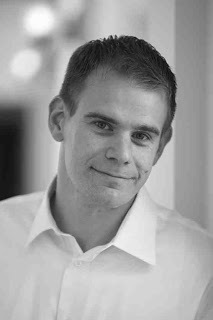
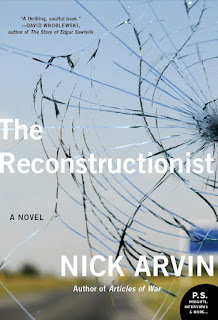
Nick Arvin wrote one of my favorite books, The Reconstructionist, about one of my favorite subjects: car crashes. What's really interesting is that Nick holds degrees in automotive and forensic engineering, which puts a whole new spin on things. His work has appeared in the New Yorker, the Wall Street Journal and more, and he's also the author of In the Electric Eden and Articles of War. He's the recipient of the Rosenthal Foundation Award from the American Academy of Arts and Letters, the Boyd Award from the American Library Association, The Colorado Book Award, and fellowships from the Michener-Copernicus Society, the Isherwood Foundation and the National Endowment of the arts.
I'm thrilled Nick agreed to write something more for my blog. Thank you, Nick!
The Curious Case Of The Book That Was Finished But Wasn't
Due to an odd circumstance, The Reconstructionist was published in the United Kingdom in a version very different from the edition published here in the United States. This came up briefly in an interview I did for Mark Stevens' blog; I thought I'd expand on the story here...
The root of the problem (if it's a problem; I'm not really sure) was that my previous novel, Articles of War , was acquired by its publisher in the UK as the first of a two book deal. That happened because my agent's counterpart in London shopped the book around and found only one publisher that was interested, and they wanted a two book deal. And I thought: Who cares how many future books they want attached to the deal! Exciting to be published overseas!
So, they did publish Articles of War in the UK. Meanwhile, I worked on The Reconstructionist. Worked and worked and worked on it. Worked on it for about four years, finished a manuscript, and sent it to my agent. He suggested some changes. I worked on those for about a year, then sent it back to him. He liked it. Hooray!
My agent began sending The Reconstructionist around to the publishers in New York. He also sent it to my UK editor. They had contractual rights to this new book, but they hadn't actually paid me anything for it yet. I figured there was a good chance that they would simply turn it down, since Articles of War didn't sell much in the UK. A month passed. And then a message came from the UK editor. She loved it! They would put it in their catalog for next spring!
Meanwhile, publishers in New York were turning it down left and right. Months passed while my agent worked through the various houses until, finally, Harper Perennial took a shine to it. It would be published in the US! Hooray!
My US editor promised comments on the book, but months passed. Meanwhile, the editor in the UK was pushing the book through copyediting, proofreading, putting together cover art, writing copy for the catalog, etc. I received the galleys. I was delighted to see that all my "tires" had been turned into "tyres," and I was finished!Except that I wasn't finished, because then received a nine-page single-spaced letter from my US editor, describing his concerns and suggestions for the manuscript.I'd been working on the book for about five years now, and the last thing I wanted to do was go through another round of major revisions. But the editor had put a lot of time, thought, and care into that letter, and I could see that the issues he was raising were legitimate.So, the UK edition sailed into bookstores at about the same time that I began working through the issues in the letter.In his letter, the US editor suggested the book needed maybe 20 additional pages at the beginning, to better set up the characters and plot. I ended up writing nearly 100 new pages. Those new pages include a quirky sequence of events centering around a lot of roadkilled wild pigs and a zombie pig on wheels. I think they'’re some of the best pages in the book, and when I describe the UK edition to readers, they often have a hard time believing that the pigs aren't in there, because they became so central to the book.What's the lesson for a writer? I suppose simply to always remain open to feedback that allows you to see new possibilities in your work. Despite the weariness involved in writing new scenes for a project that's been haunting your life for too long already, the writing in those circumstances can come quickly if the purpose of the new writing is clear, because by then the voice and characters are well defined (and if they're not, you've got bigger problems). I find it can result in some of my best writing.And, happily, there will be a new UK edition published this summer that matches the US edition.[image error]
Published on May 14, 2012 07:38
May 10, 2012
Victoria Zackheim talks about Exit Laughing, screenwriting, playwriting, and more
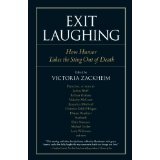
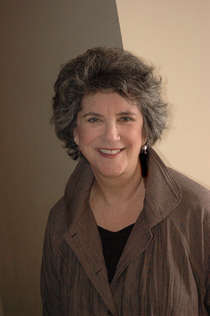
I first met Victoria Zackheim through Readerville, an online watering hole for writers and readers. And then she did something unbelievable. My husband, Jeff Tamarkin, was touring for his award-winning book, Got a Revolution, and I mentioned to Victoria that we New Yorkers were coming out to San Francisco, where she lived and perhaps we could meet for the first time.. "Well, you have to stay with me," she said. "You, Jeff, and Max (who was six at the time!) The three of us descended on her loft, never having met her, and she was so hospitable, so warm and welcoming and generous, that we all felt that we had known her for years. It was, as they say, the beginning of a spectacular friendship.Though we live on opposite coasts, we manage to see each other at least once a year, one of the highpoints for me was spending 4 days at the Pulpwood Queens Book Festival...dressed as clowns.
Exit Laughing, her latest anthology (I'm kicking myself for turning down an invitation to be in it, but at least I got to rave about it with a blurb) has just come out, and it's stellar.
Thank you, Victoria for being here, but really, thank you for everything.
Exit Laughing is about the fun side of death, theose lighter moments of a very dark time. What made you choose this topic? And were you surprised by any of the essays?
I cared for my mother during the last eighteen months of her life. We had a complicated relationship—not so unusual for a mother and daughter—and I was often frustrated by her reluctance, and sometimes unwillingness, to discuss how she felt about her life coming to an end. It wasn't until that one defining moment, when we laughed long and hard over her request to be taken to Alaska and sent out on an ice floe to die, that I realized how precious humor could be in the darkest of times. From then on, I made an effort to share humor with her: funny stories, articles I'd read, delightfully rib-tickling things said by her beloved 7-year-old great-granddaughters. Every time we laughed together, I felt another window of our relationship blow open and let in a fresh breeze.
EXIT LAUGHING is my fifth anthology, and I have to admit that I'm surprised by every essay I receive. Perhaps it's hubris, and my belief that I can second-guess what an author will write, and I have to admit that I'm wrong nearly every time! I knew that Malachy McCourt was going to write about what really happened to Angela's Ashes, but I wasn't prepared for his outrageously funny description. (Think: undertaker, body bag, sanitation truck.) I'm very familiar with Amy Ferris's writing, which usually makes me laugh out loud, so I was knocked off-center by her deeply moving revelation regarding her mother's need to have a window seat when she flew. And who but Joshua Braff could create a parallel between death and the Road Runner? So yes, I'm always surprised...and amazed...and thrilled.
What I find most remarkable about you is how you keep reinventing who you are. Not only are you a novelist, but you've become a successful editor of anthologies, and even more astonishing, you've also become a successful playwright and screenwriter. Can you talk about how all of this came about? Did any of it daunt you? And what's next up for you?
It's funny, because I've always imagined myself as a playwright and screenwriter, and that confident part of me kept nudging me forward and whispering, "You can do that, you can!" So when I began to edit the essays for my first anthology, The Other Woman, and I kept seeing women on stage, acting out the essays, I knew I had to give it a try. I chose five pieces from the book, broke them into many fragments of text, and then wove them together to form a play. The essays have changed since that first performance, and I'm very excited to say that there will be a four-week run at the Berkeley Repertory Theatre, with opening night scheduled for February 22, 2013.
As for the movie...I was at a party, it was around 2002, and one of the guests was holding us captivated by his story of how he and two friends carried off a truly amazing prison escape in Northern Ireland. Over the years, the images that he described became so real to me that I could actually see the movie unfold. When I was introduced to an independent film producer, Matt Muzio, I related this story and he loved it. A few weeks later, I handed him a screenplay; a few weeks after that and it was ready to be shopped around. Within days, it was optioned by Identity Films. I'm working on revised scenes now!
Your question about feeling daunted is very interesting. Perhaps if I were younger, I might have entered into these projects with doubt or trepidation. But I'm not young, I've got nothing to lose, and what a freeing experience it is! I'm often asked if I'm afraid to fail. How can I fail? If I give it my best and it doesn't work, I've succeeded at giving my best. For me, the only true failure is not giving it a try.
Let's talk process. How do you write? What's your working day like?
I'm usually up, dressed, fed and ready to work by 7 AM. If I'm in the middle of writing, I might write until early evening, take a break for dinner, and then keep working until there's nothing left...which can happen at 9 PM or 4 AM, depending if I'm in that zone. I don't recommend working like this...it's very hard on the body...but it's how I've always worked. And yes, I've even set alarms to make me stand up and move around, but sometimes I work with such focus that I don't hear the alarm!
What's obsessing you now?
Identity Films got excellent and enthusiastic input from several potential directors, so now I'm shifting the focus of the screenplay and writing entirely new scenes. I LOVE doing this, but I must admit to getting a wee bit obsessive about doing it right!
What question didn't I ask that I should have?
I have a new project, which I'll begin as soon as the screenplay is finished and delivered. My theater partner, producer/director Ellie Mednick, and I have just been given the rights to the memoir, Entangled, which I'm going to adapt to the theater. I'm very excited about this and can't wait to get to work!
Published on May 10, 2012 08:57
Amy Hatvany talks about forgiveness, fathers and daughters, and Outside the Lines
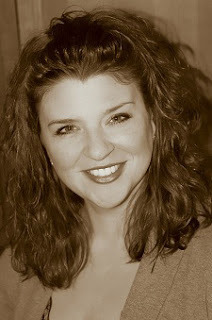
I was honored to blurb Amy Hatvany's terrific new novel, Outside the Lines, about finding a father you thought was lost to you, and forgiveness. It was a book I loved so much, I asked Amy if she would write something for the blog. Thank you so, so much, Amy.
My Father, Myself - Amy Hatvany, on OUTSIDE THE LINESI didn’t plan to write a novel about a father and daughter. All of my books have dealt with varying themes of motherhood - perhaps because I have been in the throes of baby/toddler/grade-schooler-ville for the better part of a decade. Being a mother encompassed me in a way I’d never experienced, and when I get obsessed about something, processing it on the page is the only way I know how to make any sense of it at all. (Maybe I’m a slow learner, but I’m still not sure I have much about this mommy-gig figured out; most of the time I just wing it.)But, as my children have (finally!) started to brush their teeth, shower, and get dressed without being strong-armed into it, I believe my mind made room for something different. I didn’t know what I was going to write about next - in fact, I’d begun to feel a little panicky about it (Will I ever write again? Maybe I’m just a fraud!) - and then, out of nowhere, I had a dream a few months after my father had died: I was walking along a sandy beach, wind whipping my hair around my face, the sun still shining on an icy winter day. Suddenly, I spotted a blue tarp over a pile of driftwood, and as I lifted it up, I realized my father was curled beneath. He was skinny, bedraggled, and appeared disoriented. When I woke, I was struck by the overwhelming feeling that he had been lost, was suffering, and I’d been looking for him for a long time. In that moment, the premise of OUTSIDE THE LINES was born. I began writing about Eden West, a woman searching for her homeless and mentally-ill artist father, David, whom she’s been estranged from for twenty years. I wrote from his view point and hers, both past and present, so the reader would see how close they were and how their relationship fractured when she was only ten. And then later, what drives her to find him again. As I wrote, I thought deeply about the sometimes emotionally tumultuous relationship I had with my own father. How much I loved him, and yet, for whatever reason, how we never seemed to connect the way I hoped. I thought about what a profound influence needing a father’s unconditional love and acceptance has on a woman’s choice in romantic partners. I often wondered if my father was alive to read this story when I was finished writing it, would he understand that I forgave him long ago for any of his flaws, simply because as a parent now, I’m keenly aware of so many of my own? I hope so. I hope wherever he is, he’s kicking back with this new book of mine and whispering, “Don’t worry, honey. I forgive you, too.”
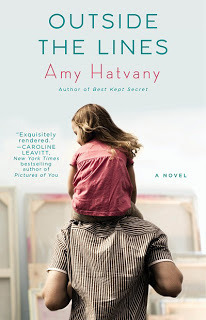
Published on May 10, 2012 08:39



